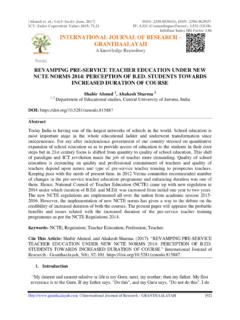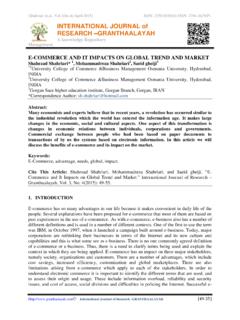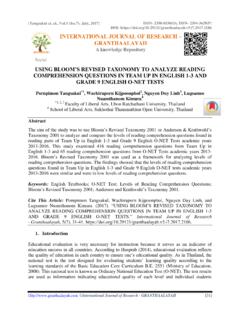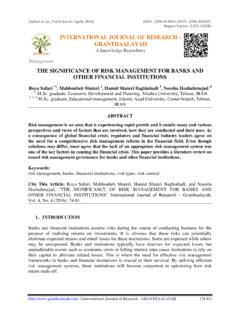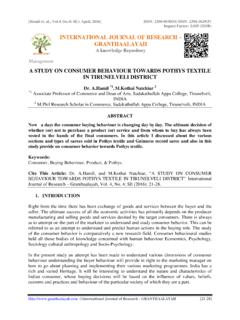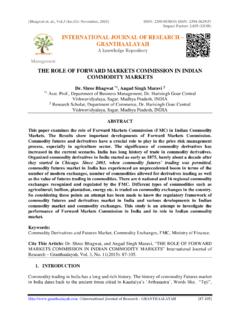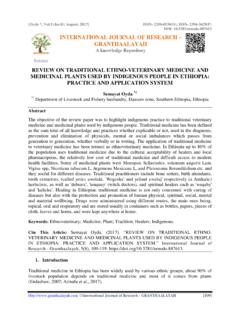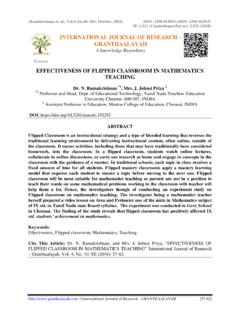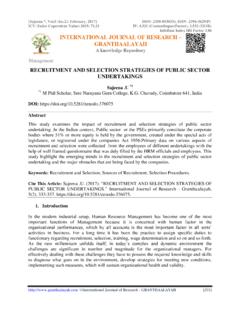Transcription of INTENTIONS TOWARDS SOCIAL …
1 [Chengalvala et. al., ( ): June, 2017] ISSN- 2350-0530(O), ISSN- 2394-3629(P) ICV (Index Copernicus Value) 2015: IF: (CosmosImpactFactor), (I2OR) InfoBase Index IBI Factor International Journal of Research - GRANTHAALAYAH [406] Management INTENTIONS TOWARDS SOCIAL ENTREPRENEURSHIP AMONG UNIVERSITY STUDENTS IN INDIA Dr. Sarada Chengalvala1, Dr. Satyanarayana Rentala2 1 Associate Professor in Commerce, VSR Government Degree and PG College, Movva (Krishna District), Andhra Pradesh - 521 135, India 2 Program Manager - South Zone, Piramal Foundation for Education Leadership, A-56, Panchseel Enclave, New Delhi 110 017, India DOI: Abstract SOCIAL entrepreneurship is the ability to be an agent of change for various economic, environmental, SOCIAL and political issues at local and global levels. It is believed that exposure of youth to SOCIAL entrepreneurial theories and practice in institutes of higher education can impact this change.
2 The students in various universities armed with knowledge and skills that they gained, with the support of entrepreneurial culture and environment while in campus may help them to choose SOCIAL entrepreneurship as a career option after their formal education. In this backdrop, this research aims to identify the levels of entrepreneurial INTENTIONS and SOCIAL entrepreneurship among University students. A sample of 150 university students across the country was included in the research. Factor analysis was used to identify factors that influence SOCIAL entrepreneurship INTENTIONS . Five factors which influence SOCIAL entrepreneurship INTENTIONS were identified - SOCIAL entrepreneurship interest, entrepreneurial attitude, proactive personality, entrepreneurship education and perceived behavioral control. Furthermore, correlation analysis was conducted to investigate the relationship amongst SOCIAL entrepreneurship INTENTIONS factors.
3 The results were significant which indicated that there was a positive linear inter-factor association. Keywords: Entrepreneurship; Entrepreneurship Education; Career INTENTIONS ; SOCIAL Entrepreneurship. Cite This Article: Dr. Sarada Chengalvala, and Dr. Satyanarayana Rentala. (2017). INTENTIONS TOWARDS SOCIAL ENTREPRENEURSHIP AMONG UNIVERSITY STUDENTS IN INDIA. International Journal of Research - Granthaalayah, 5(6), 406-413. [Chengalvala et. al., ( ): June, 2017] ISSN- 2350-0530(O), ISSN- 2394-3629(P) ICV (Index Copernicus Value) 2015: IF: (CosmosImpactFactor), (I2OR) InfoBase Index IBI Factor International Journal of Research - GRANTHAALAYAH [407] 1. Introduction Entrepreneurship is the dynamic method of making progressive wealth. The wealth is formed by people who are ready to take the risks in terms of equity, time or give value for a few product or service.
4 Entrepreneurship is the creation of little to medium businesses, plays a significant role in creating wealth for the person, rise in employment opportunities, improving quality of living, and provides platform for innovation, and increase in productivity in any country. Adoption of entrepreneurship among university students has become a significant topic among entrepreneurship researchers. The university is an establishment, wherever students pass on toward next stage of operating life. Right after the graduation, students decide how to go forward with their life. The entrepreneurial initiatives play a key role in developing a country s economic and SOCIAL wellbeing. An entrepreneur may be a person who seeks for changes of life and environment around him, and to use the change as a chance to move forward. With sufficient requirement of capital, education and own innovation, intelligence, energetic is changed into a professional business individual.
5 A SOCIAL entrepreneur identifies executable solutions to SOCIAL issues by bringing together innovation and chance. They draw upon wise thinking in each the business and nonprofit worlds and operate altogether varieties of organizations. Over the past 20 years, the SOCIAL sector has discovered what the business learned long ago, there's nothing as powerful as a replacement plan within the hands of a primary-class entrepreneur. SOCIAL entrepreneurs are covered with their ideas, and providing their lives to ever-changing the direction of their field. They are visionaries, however additionally realists, and area unit ultimately involved with the sensible implementation of their vision specifically else. SOCIAL entrepreneurs present easy, graspable, and ethical ideas that have interaction widespread support so as to maximize the quantity of citizens that may rise, seize their plan, and implement it.
6 SOCIAL entrepreneurship is that the way of failures with financially sustainable innovations geared toward identifying SOCIAL problems has emerged. It s a replacement breed of entrepreneurship that exhibits characteristics of nonprofits, government, and businesses together with applying to SOCIAL problem-solving traditional; private-sector entrepreneurships target innovation, risk- taking, and large-scale transformation. Dedicated to supply SOCIAL price, these entrepreneurs establish new processes, services and product, or excusive ways in which of mixing verified observe with innovation to deal with complicated SOCIAL issues. In this research, an attempt is made to understand the INTENTIONS of university students regarding SOCIAL entrepreneurship as a future career of choice. Additionally, this research also attempts to understand the challenges perceived to undertake SOCIAL entrepreneurship as a career choice among university students in India.
7 [Chengalvala et. al., ( ): June, 2017] ISSN- 2350-0530(O), ISSN- 2394-3629(P) ICV (Index Copernicus Value) 2015: IF: (CosmosImpactFactor), (I2OR) InfoBase Index IBI Factor International Journal of Research - GRANTHAALAYAH [408] 2. Review of Literature A study about the attitudes of the youth in India by Agarwal and Upadhyay (2009) identified family background and educational qualifications as key dimensions of entrepreneurial INTENTIONS . The authors suggest that entrepreneurial INTENTIONS have long been established as crucial for the process of entrepreneurship since they provide the impetus for entrepreneurial ideas to become manifested. Ahmed et al (2010) concluded that it is difficult to differentiate entrepreneur from non-entrepreneur on the basis of age, gender or entrepreneurial back ground, as the findings suggest that there is no significant relationship between these variables and INTENTIONS to become entrepreneur.
8 But, family background and level of education mattered while intending to become an entrepreneur. Students in senior classes are more inclined TOWARDS entrepreneurship because of their higher levels of knowledge and practical exposure with the field and market. Maalu (2012) analysed the perceptions of public secondary students in Nairobi regarding entrepreneurship as a career. The findings revealed that majority of students in public secondary schools in Nairobi had a positive perception of entrepreneurship as a career. While majority of them indicated that they would want to pursue a career in entrepreneurship after completing school, several factors emerged as possible barriers to their entry into entrepreneurship. Majority of students perceived insufficiency of funds, stiff competition and insufficient knowledge on how to run the business as major challenges. Lorz (2011) applied the theory of planned behavior to entrepreneurship education.
9 Initial results from the qualitative analysis of the entrepreneurial-trigger events proposed a possible blend of the theory of planned behavior and elements of the entrepreneurial event model. Entrepreneurial trigger-events may represent the tipping point for those students with an already high entrepreneurial intention to turn ideas into reality and become self-employed. Having completed this study, the author believes that entrepreneurship education is still of crucial importance for facilitating entrepreneurship. Mueller and Neck (2010) suggest that traditional entrepreneurship courses offer the foundational skill set for all entrepreneurial ventures regardless of type. The authors contend that the content in entrepreneurship course does not require repetition in SOCIAL entrepreneurship classes. Rather, SOCIAL entrepreneurship classes should focus on the specific issues uncovered in the research such as SOCIAL impact, aligning personal values and interests with the entrepreneurial behavior and balancing SOCIAL and economic aspects of business.
10 The personal values and interests category comprises reasons reflecting the belief that with entrepreneurial actions one can act according to personal values, motives, passions, and interests. Nga and Shamuganathan (2010) found that certain personality traits such as agreeableness, openness and conscientiousness exert an influence on SOCIAL entrepreneurship dimensions. The implication of how the development of character and SOCIAL entrepreneurship can be inculcated through student-centred learning and life-long learning had been highlighted in the study. [Chengalvala et. al., ( ): June, 2017] ISSN- 2350-0530(O), ISSN- 2394-3629(P) ICV (Index Copernicus Value) 2015: IF: (CosmosImpactFactor), (I2OR) InfoBase Index IBI Factor International Journal of Research - GRANTHAALAYAH [409] A study by Nian et al, (2014) provides an important exploratory analysis for entrepreneurship education.
